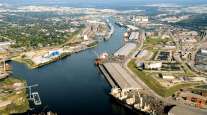Independent Contractor Rules Could Disrupt Drayage Operations

[Stay on top of transportation news: Get TTNews in your inbox.]
LONG BEACH, Calif. — The drayage industry relies on owner-operators and the independent contractor model to move freight, but state action in California and New Jersey could limit the number of owner-operators available to work and disrupt drayage operations.
“In the current business model, we need that independent owner-operator to exist,” said David Hensal, CEO of Eagle Systems, an intermodal drayage provider based in Caldwell, N.J. “I think if we don’t solve this problem, we’ll only be able to operate in those states that allow the owner-operator model. I think you’ll see cargo flows move out of ports that aren’t friendly.”

Shawn Yadon moderated the panel discussion. (Mindy Long for Transport Topics)
Hensal was speaking during a panel discussion at IANA Expo 2019.
California recently passed Assembly Bill 5, by which the state would reduce what it has called widespread misclassification of independent contractors. AB5, if approved by the governor, will take effect Jan. 1.
“The first step to bring freight into the country is at the port, and almost all of that is owner-operators. If you take that amount of capacity out of this market 3½ months from today, that is a shock,” said Jim Filter, vice president of intermodal operations at Schneider. The Green Bay, Wis., company ranks No. 7 on the Transport Topics Top 100 list of the largest for-hire carriers in North America.
The New Jersey Department of Labor and U.S. Department of Labor have signed a joint agreement to step up efforts to protect employees, including truck drivers, from illegal misclassification as independent contractors.
New Jersey requires the ABC test, which was established by the Dynamex case in California. The three-pronged ABC test dictates that a worker is considered an independent contractor if he or she is A) free from the control and direction of the hiring entity, B) performs work that is outside the usual course of the hiring entity’s business and C) is customarily engaged in an independently established trade, occupation or business of the same nature as the work performed.

Also at IANA
“My perspective is now California is evolving to other locations,” Hensal said. “We’re under attack in many other states, especially from New Jersey.”
California Trucking Association CEO Shawn Yadon said AB5 does not differentiate between the leased owner-operator and truly independent owner-operators with their own authority,
“Every possible option for the owner-operator/independent contractor is blown out of the water by that decision and that legislation,” he said.
Hensal and Yadon, along with John Larkin, operating partner of Clarendon Capital, and Joe Rajkovacz, director of governmental affairs and communications for the Western States Trucking Association, also took part in the panel discussion.
Rajkovacz said lawmakers have failed to understand that people want to operate independently.
“Politicians simply believe that anyone who is an owner-operator is an indentured servant that can’t find two nickels to rub together,” he said.
Many drivers became owner-operators because they wanted to make their own money and have flexibility over where they work, Rajkovacz said. “If you take that away and tell me it is a W-2 and forced dispatch, there are a lot of people who say, ‘I’m done.’ This is going to cause some of the most experienced owner-operators and drivers in the industry to just say, ‘See ya.’ ”
If the conventional owner-operator drayage model goes away, larger, more consolidated industry participants will have to intervene and take back some of the operations with company power, Larkin said.
Yeni Hercules, CEO of H&P Logistics, which is based in Gardena, Calif., said owner-operators don’t want to become company drivers.
“They bought a truck and started a business,” she said. “They want flexibility, and they want to work when they want to.”
Hercules has eight company trucks and uses five owner-operators. Hercules said not all drivers want to work at the port, and it would take time to get a new crop of drivers used to port operations.
Schneider has limited the number of owner-operators it uses and is down to about a dozen across the country, but the third parties it uses rely on owner-operators.
“From what we can see, a lot of the third parties we use are 85-100% owner-operators, so it takes real capacity out of the marketplace for us starting early next year,” Filter said.

Shawn Yadon (from left), David Hensal, John Larkin and Joe Rajkovacz by Mindy Long for Transport Topics.
Hensal said he is looking at options, which could include leaving New Jersey or having owner-operators moving to S-corporations.
An S-corporation is a structure of business ownership by which the business avoids double taxation. Its business income is taxed, but the company is not required to pay corporate income tax on its profits.
Some large carriers have located east of California in Arizona and Nevada.
“Those carriers will be in pretty good position because they can send drivers in to deliver a load and then go shag some loads from the port. They’re going to have a real advantage,” WSTA’s Rajkovacz said.
Clarendon Capital’s Larkin said changes in the economics of the drayage components could shift where freight arrives in U.S.
“Railroads prefer for it to arrive in the West Coast because 70-80% that arrives here shifts to the rail,” he said. “If it moves to the East Coast, only about 30% of that traffic ends up moving on the railroad.” He added that few ports have the major infrastructure that the ports in Los Angeles and Long Beach have.
Panelists and several operators attending the Expo agreed there needs to be consistency nationwide.
“We want one set of rules. We can’t manage every state differently for interstate commerce,” Hensal said.
WANT MORE NEWS? Listen to today's Daily Briefing
Greg Stefflre, CEO for Rail Delivery Services Inc., based in Fontana, Calif., said he believes in the owner-operator model and thinks the industry will reach a resolution.
“If we go back to a Balkanized world where every state tells you what to do, it will ruin trucking,” he said.



